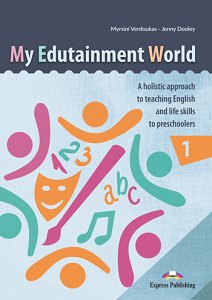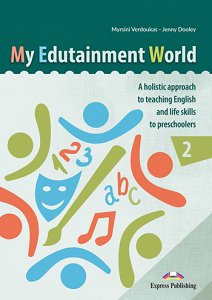Equipping our students with life skills along with intellectual competency is the main objective of English language teaching over the last years.
If you teach young learners, My Edutainment World 1 and My Edutainment World 2 feature a wide range of activities that enhance critical thinking and foster life skills early on. Each activity of the books requires easy-to-get supplies and sets the ground for communicative, active-learning activities that encourage students to communicate, explore, and experiment, in English.
Cooking classes, yoga lessons, and arts and crafts are all exploited to organically expose young learners to English while honing skills and competencies that go beyond language learning.
Below, we share some tips to make the most of the activities:
-
Be well-prepared:
Even if you are an experienced teacher good preparation is always recommended. Maybe for experienced teachers, the process will take up less time, but it is still necessary. In that way, you will relax and enjoy the lesson rather than trying to organize everything while the kids become restless or bored.
-
Be an entertainer:
Humour and fun are the triggers of the brain. If you manage to trigger the kids’ brains, then you can be sure that they will participate in all the tasks you want them to be involved in. Be enthusiastic, fun to be with, and energetic. In that way, students will be engaged at all the times of your lesson.
-
Be a role model:
Treat your students the way you would like to be treated too. Negative feelings. irony, bitter comments, shouting, and raising your voice are not ideal. Use ‘please’ and ‘thank you and be polite at all times because it demonstrates courtesy and respect. Be the teacher who believes in them, their supporter, and the one who accepts them for who they are. In general, set a good example, show them and guide them towards the desired behaviour in a positive and inspiring way.
-
Make them feel secure:
Learning a foreign language is always an overwhelming process for a lot of kids, even if they have had some years of prior exposure to it. There are always new areas, rules, words to learn, and since it is a foreign language that means that they don’t often get the chance to use it on a daily basis, so communication might seem like a nightmare to them. Respect their fears and work on the solution in a friendly way with them. Greet them politely, explain everything willingly, and generally create a positive environment where asking for advice won’t be a stressful situation but the most natural thing in the world!
-
Provide safety:
This tip is crucial especially for very young learners. Try to create a safety net for them inside and outside the classroom. The young ones are very energetic and they always run around. Avoid having kids running with objects like sticks or other things that could hurt them if they fall. Also, make sure that there is enough space for them to carry out any actions without accidentally hitting each other.
-
Give simple and clear instructions:
Explain everything in a simple way, and always remember to give examples. One step at a time is a golden rule to keep in mind as, regardless of age, quite a lot of kids find it really hard to remember a lot of different instructions at the same time.
-
Set specific goals:
Your goals and expectations must be clear and well defined. Vague or generalized goals are unhelpful because they don't provide sufficient direction. Remember, you need goals to show your students the way. Also, the ‘one step at a time rule’ should also be applied in this case as a lot of different goals might be intimidating and cause fear, stress, and sometimes distraction and lack of participation on behalf of the students.
-
Be flexible:
If something is not working then change it! Don’t stick to things that cause boredom and indifference just because they are on the syllabus.
-
Manage your time:
This tip is closely related to the preparation tip as if you have prepared a lot of stuff before the actual lesson then it will be easier to manage your time during it. Especially when you wish to include experiential and hands-on activities then you need to take into consideration that you should always leave some time for cleaning up and putting things you have used away.
-
Set your rules:
Classroom rules should be established from day one. Be consistent in applying them and don’t be afraid to be a bit strict from time to time. Also, explain to them the difference between strict and bossy. They will surely appreciate it!
Check our Resources Guide for Pre-Primary and Primary levels and learn more about our coursebooks and supplementary material!
.png)








